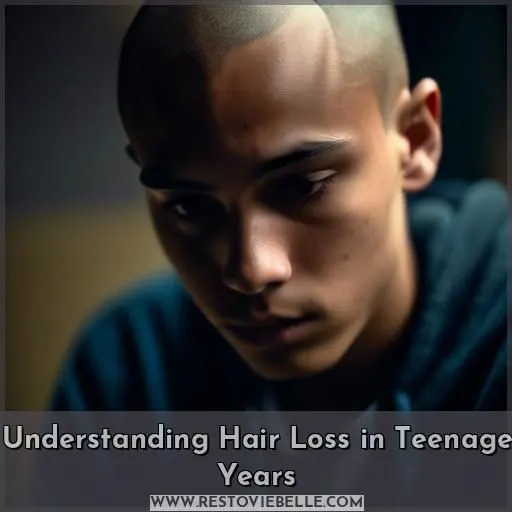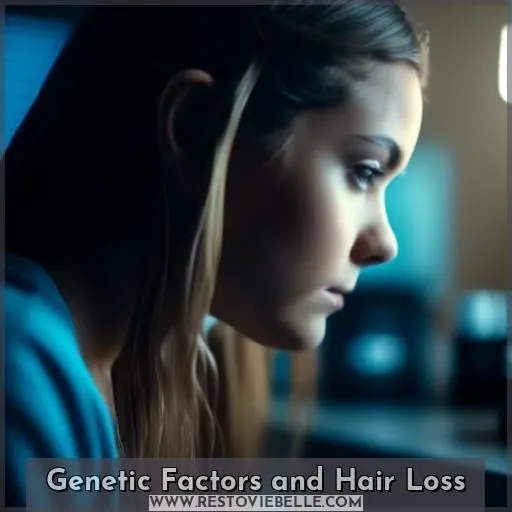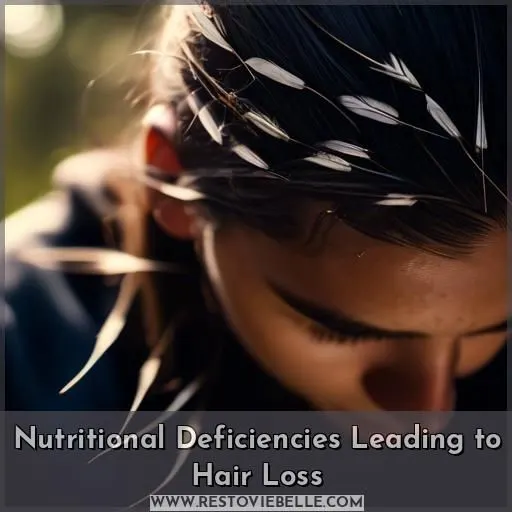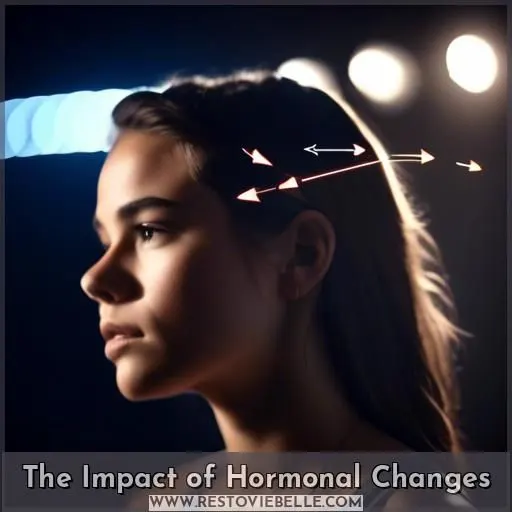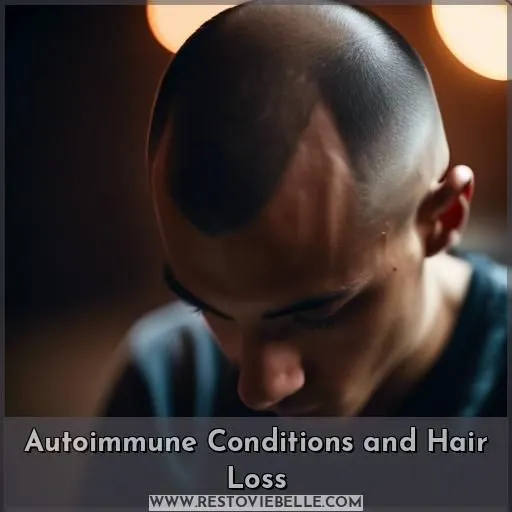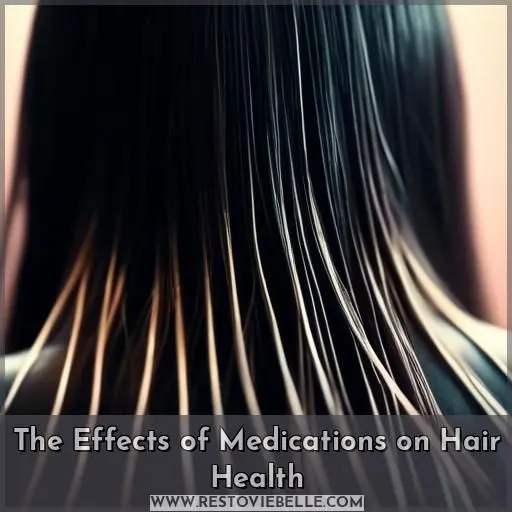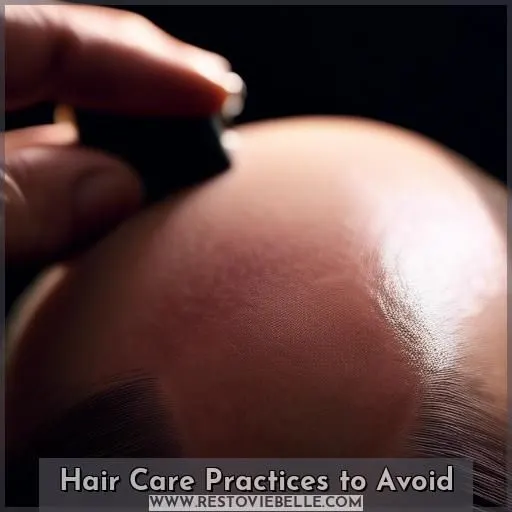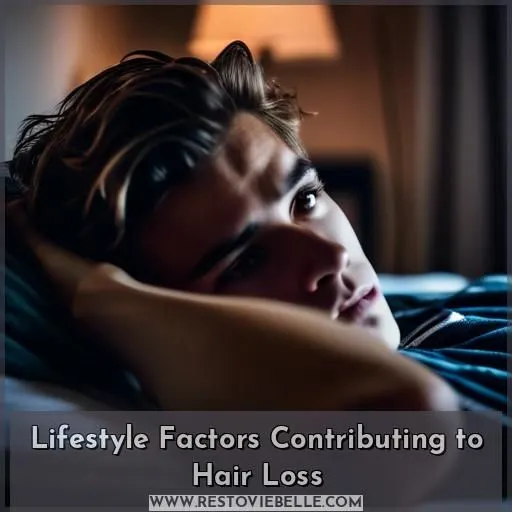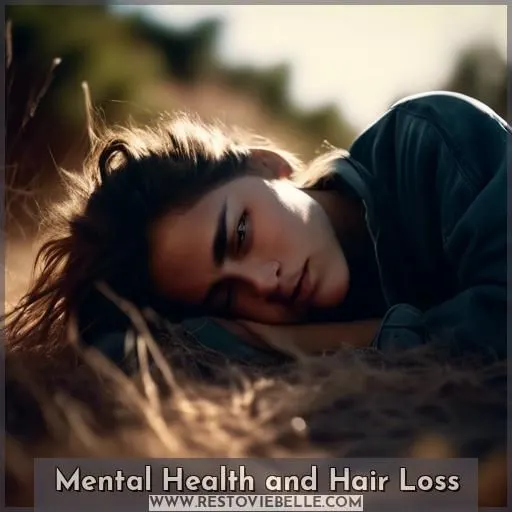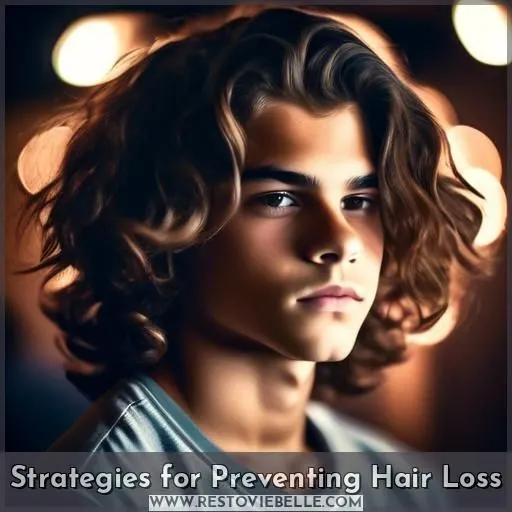This site is supported by our readers. We may earn a commission, at no cost to you, if you purchase through links.
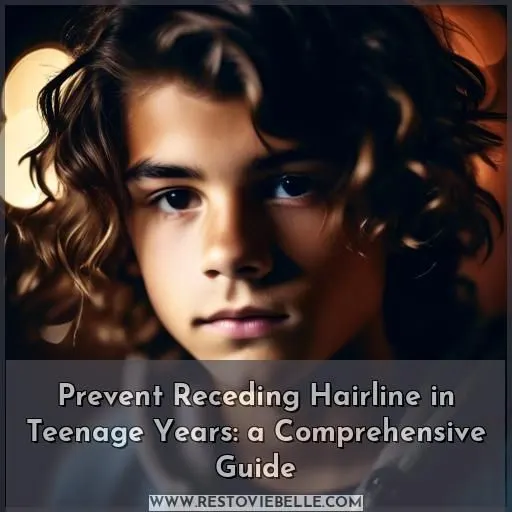
To prevent a receding hairline in your teenage years, you’ll need to address multiple aspects.
Genetics play a role, so identifying nutritional deficiencies like iron, zinc, and vitamin imbalances is essential.
Hormonal shifts from thyroid issues or PCOS can contribute.
Lifestyle factors like stress, poor sleep, and aggressive hairstyling should be avoided.
An autoimmune condition like alopecia areata may be the underlying cause.
Consulting healthcare professionals, enhancing your diet, and establishing a gentle hair care routine are key steps.
Further insights await if you’re ready to delve deeper into this extensive guide.
Table Of Contents
- Key Takeaways
- Understanding Hair Loss in Teenage Years
- Genetic Factors and Hair Loss
- Nutritional Deficiencies Leading to Hair Loss
- The Impact of Hormonal Changes
- Autoimmune Conditions and Hair Loss
- The Effects of Medications on Hair Health
- Hair Care Practices to Avoid
- Lifestyle Factors Contributing to Hair Loss
- Mental Health and Hair Loss
- Strategies for Preventing Hair Loss
- Conclusion
Key Takeaways
- Genetics, hormonal changes, nutritional deficiencies, and environmental factors can contribute to hair loss in teenagers.
- Consulting healthcare professionals, addressing underlying health conditions, and improving diet and nutrient intake are key steps to prevent hair loss.
- Lifestyle changes, such as managing stress, avoiding tight hairstyles, and using gentle hair care products, can also help promote healthy hair growth.
- If hair loss persists, more invasive treatments like platelet-rich plasma (PRP) therapy or hair transplantation may be necessary.
Understanding Hair Loss in Teenage Years
Hair loss in teenage years can be a distressing experience, affecting both males and females. It’s essential to understand the causes and potential treatments to prevent further hair loss and promote healthy hair growth. Hair loss in teenagers can be attributed to various factors, including genetics, hormonal changes, nutritional deficiencies, and environmental factors.
Male pattern baldness, also known as androgenetic alopecia, is a common genetic cause of hair loss that can begin during teenage years. It’s characterized by a receding hairline or thinning hair at the crown. Alopecia areata is an autoimmune condition that can cause hair to fall out in patches, affecting about 2% of the population, with most cases starting before age 30.
Hormonal changes during puberty can also lead to hair loss, as hormonal fluctuations can affect the growth and thickness of hair. Stress, whether emotional or physical, can disrupt hair growth and cause hair to fall out. Nutritional deficiencies, particularly in iron, zinc, and vitamin C, can contribute to hair loss in teenagers.
Environmental factors such as exposure to free radicals, harsh hair care products, and tight hairstyles can damage hair and lead to hair loss. Smoking and excessive alcohol consumption can also contribute to hair loss.
To address hair loss in teenagers, it’s essential to consult a healthcare professional for a proper diagnosis and treatment plan. Treatments may include hair loss medications like minoxidil or finasteride, addressing underlying health conditions, and improving diet and nutrient intake.
Lifestyle changes, such as managing stress, avoiding tight hairstyles, and using gentle hair care products, can also help promote healthy hair growth. If hair loss persists, it may be necessary to explore more invasive treatments like platelet-rich plasma (PRP) therapy or hair transplantation.
Genetic Factors and Hair Loss
Your genetics play a major role in determining your susceptibility to hair loss during your teenage years.
Male pattern baldness, also known as androgenetic alopecia, is a hereditary condition that can manifest in adolescence, particularly if you have close relatives who’ve experienced it.
In addition, nutritional deficiencies and certain lifestyle factors can worsen or contribute to hair thinning and loss.
This emphasizes the importance of a balanced diet and a healthy lifestyle for maintaining a full head of hair.
Genetic factors and hair loss
Genetics play a significant role in hair loss, particularly in male pattern baldness (androgenetic alopecia).
The age of onset and severity can vary, with some experiencing hair loss as early as teenage years.
Hair loss can impact self-esteem and emotional well-being, so it’s essential to seek support and explore treatment options.
Finasteride, biotin, and other hair loss treatments may be considered.
Additionally, alopecia areata and telogen effluvium can be triggered by genetics, so understanding these conditions is vital.
Nutritional deficiencies and hair loss
Battling hair loss in your teen years? It’s not just a genetic lottery.
Iron, zinc, vitamin C, biotin, and niacin are your hair’s best pals.
Skimping on these can turn your lush locks into a sparse landscape.
Whether you’re a guy or a girl, ensuring these nutrients are in your diet is key to preventing and treating hair loss.
Don’t let your mane go hungry!
Lifestyle factors and hair loss
As a teenage guy, it’s paramount to be cognizant of the lifestyle factors that can lead to hair loss. These factors encompass excessive alcohol consumption, disrupted sleep patterns, smoking, and unhealthy dietary choices. Alcohol can result in nutritional deficiencies, dehydration, and hormonal imbalances, all of which can affect hair growth and lead to hair loss. Smoking can also impair hair follicles and contribute to premature balding. Poor sleep quality or insufficient sleep can indirectly contribute to hair loss by elevating stress hormones and impacting hair growth.
To avert hair loss, it’s imperative to maintain a balanced diet, prioritize restful sleep, and avoid excessive alcohol consumption. If you’re experiencing hair loss, it’s essential to consult a healthcare professional to ascertain the underlying cause and explore appropriate treatment options.
Nutritional Deficiencies Leading to Hair Loss
Nutritional deficiencies contribute significantly to hair loss, particularly during adolescence when bodies rapidly grow and mature. It’s essential to guarantee sufficient consumption of vital nutrients like iron and zinc, along with vitamins such as biotin, vitamin C, and vitamin D. These nutrients are integral to maintaining healthy hair follicles and preventing hair thinning or receding hairlines.
Importance of Iron and Zinc
Essential nutrients like iron and zinc are vital for preserving hair health and averting hair loss.
Iron deficiency can result in anemia, which may cause hair loss.
Zinc deficiency can lead to a reduction in hair follicles, resulting in hair loss.
Including iron-rich foods like red meat, spinach, and lentils, and zinc-rich foods like oysters, nuts, and beans can contribute to maintaining healthy hair.
Hair growth treatments like saw palmetto and volumizing shampoos can also assist in preventing a receding hairline during teenage years.
Role of Vitamins in Hair Health
As a teenage guy, you might be experiencing hair loss due to various factors, including vitamin deficiencies. Vitamin deficiencies can lead to hair loss, and it’s crucial to understand which vitamins are important for hair health.
B vitamins, such as B2 (Riboflavin), B3 (Niacin), and B5 (Pantothenic acid), play a significant role in hair health. They support cellular development, metabolism, energy production, and maximize nutrient absorption by hair follicles, improving hair quality and quantity. A deficiency in Riboflavin, for example, can lead to hair loss.
In addition to B vitamins, other vitamins like Vitamin D are also important for hair health. A deficiency in Vitamin D can lead to hair loss and decreased hair density. Vitamin D is believed to stimulate hair follicles.
To address these vitamin deficiencies, consider incorporating a balanced diet rich in vitamins and minerals. Foods like fatty fish, eggs, lean meats, and nuts can contribute to healthier hair. If you’re experiencing hair loss due to vitamin deficiencies, consult a healthcare professional for personalized advice and treatment options.
The Impact of Hormonal Changes
You’re likely aware that hormonal changes during puberty can substantially affect hair health.
Thyroid disorders and polycystic ovary syndrome (PCOS) are two conditions that can disrupt hormonal balance. These conditions often lead to hair loss or thinning hairline during the teenage years.
These hormonal imbalances should be promptly addressed through medical consultation and appropriate treatment. This will help mitigate further hair loss and encourage healthy hair growth.
Thyroid Disorders
Thyroid disorders can lead to hair loss, with hypothyroidism being more common than hyperthyroidism. Hypothyroidism, or an underactive thyroid, can cause insufficient amounts of thyroid hormone, leading to hair loss. Symptoms of hypothyroidism include fatigue, weight gain, cold intolerance, and hair loss. Treatment for hypothyroidism often involves thyroid hormone replacement medication, such as levothyroxine.
Hyperthyroidism, or an overactive thyroid, can cause excessive amounts of thyroid hormone, which can also lead to hair loss. Symptoms of hyperthyroidism include anxiety, rapid heartbeat, weight loss, and hair loss. Treatment for hyperthyroidism may involve medications like methimazole or surgery to remove part or all of the thyroid gland.
To manage thyroid-related hair loss, it’s imperative to consult a healthcare professional for proper diagnosis and treatment. This may include thyroid hormone replacement therapy, adjusting medication dosages, or addressing underlying autoimmune conditions. Additionally, maintaining a balanced diet and taking care of your hair can help improve its health and resilience.
Polycystic Ovary Syndrome (PCOS)
Just as thyroid disorders can throw your hormones out of whack, PCOS is another hormonal curveball. This syndrome can lead to a cocktail of symptoms like irregular periods, weight gain, and acne. It’s like your body’s playing a game of hormonal Jenga, and when the blocks tumble, your hair might too. Keep an eye out for these signs!
Autoimmune Conditions and Hair Loss
You may experience hair loss as a teenager due to autoimmune conditions like alopecia areata and lupus. Alopecia areata causes patchy hair loss, often starting before age 30, while lupus, an inflammatory disease, can also trigger hair thinning or shedding.
Alopecia Areata
Alopecia Areata (AA) is an autoimmune disorder that causes hair loss in patches, often affecting the scalp but can also impact other hair-bearing areas of the body. It’s characterized by the immune system mistakenly attacking hair follicles, leading to hair loss without permanent damage to the follicles. The condition can be unpredictable, with some individuals experiencing only one episode of hair loss during their lifetime while others may have recurrent episodes.
Severity of Alopecia Areata
The severity of Alopecia Areata can vary widely. Some patients may only experience a single episode of hair loss, while others may have extensive or even complete hair loss. The condition can present as isolated, smooth, non-scarring patches of hair loss, typically on the scalp, but it can occur anywhere with hair growth.
Treatment for Alopecia Areata
Treatment options for Alopecia Areata include corticosteroids applied topically or injected into affected areas, topical immunotherapy, anthralin application, minoxidil, and oral JAK inhibitors for more severe cases. Treatment responses can vary, and most treatments have potential adverse effects. It’s paramount to consult a healthcare professional to determine the most appropriate treatment plan.
Triggers and Prognosis
While the exact triggers for Alopecia Areata aren’t fully understood, genetic factors and stress may play a role. The prognosis of Alopecia Areata is unpredictable, with some patients experiencing spontaneous resolution and regrowth of patches, while others may have recurrent episodes or extensive hair loss.
Prevention and Management
Preventing Alopecia Areata is challenging, but maintaining a healthy lifestyle, managing stress, and avoiding triggers may help. Regularly consulting a healthcare professional is integral for monitoring the condition and managing its impact on emotional well-being.
Lupus
Just like alopecia areata, lupus can play a sneaky game with your hair, leading to lupus hair loss. But don’t throw in the towel just yet! With the right lupus hair care and treatment, you can encourage lupus hair growth and even regrowth. Let’s break it down:
| Lupus Hair Woes | Lupus Hair Wins |
|---|---|
| Hair loss | Potential regrowth |
| Thinning strands | Improved hair care |
| Breakage | Targeted treatments |
| Slow growth | Healthier diet |
| Discouragement | Renewed confidence |
The Effects of Medications on Hair Health
Medications can cause hair loss as a side effect. Here are three common examples:
- Antidepressants: Certain antidepressants, such as fluoxetine (Prozac), sertraline (Zoloft), and paroxetine (Paxil), can lead to hair loss in the telogen phase, causing an increase in shedding.
- Anticoagulants: Blood thinners like warfarin (Coumadin) and heparin can cause hair loss known as telogen effluvium, which affects the entire scalp.
- Chemotherapy drugs: These medications are well-known for causing drug-induced alopecia, which can affect any part of the scalp or body, and the extent and duration of hair loss depend on the medication and dosage.
If you suspect a medication is causing hair loss, consult your healthcare professional for advice on alternative treatments or dosage adjustments. In most cases, hair loss from medication is temporary and will resolve once the medication is stopped or the dosage is adjusted.
Hair Care Practices to Avoid
You should avoid tight hairstyles like cornrows, braids, or ponytails that pull on your hairline and scalp, as they can cause traction alopecia and permanent hair loss. Similarly, harsh chemical treatments like hair dyes, relaxers, and straighteners can damage your hair follicles and exacerbate hair thinning or receding hairlines, especially if used excessively or incorrectly.
Tight Hairstyles
Avoid tight hairstyles like braids, dreadlocks, tight buns, and ponytails. These styles can cause traction alopecia, a type of hair loss due to constant pulling on the hair follicles. Opt for loose hairstyles or protective styles that don’t put excessive tension on your scalp. Remember, your hair health is worth it!
Harsh Chemical Treatments
Avoid harsh chemical treatments like bleach damage, harsh dyes, chemical relaxers, and keratin treatments. These can damage your hair and lead to hair loss. Opt for gentle hair care products and limit the use of hair extensions to prevent unnecessary stress on your scalp.
Lifestyle Factors Contributing to Hair Loss
You’re probably already aware that smoking is terrible for your overall health, but did you know it can also contribute to hair loss?
Cigarette smoke contains toxins that damage hair follicles, restricting the nutrient and oxygen supply. This leads to thinner hair and an increased risk of a receding hairline.
Additionally, chronic stress and poor sleep habits disrupt your body’s hormone balance, inhibiting hair growth and potentially accelerating hair loss during your teenage years.
Smoking
Smoking is a lifestyle factor that can contribute to hair loss.
The chemicals in cigarettes can damage hair follicles, leading to thinning and shedding.
Additionally, smoking can increase the risk of developing cancer.
Cancer can be treated with chemotherapy, another cause of hair loss.
If you’re a smoker, consider quitting to improve your overall health and reduce the risk of hair loss.
Poor Sleep and Stress
Sleep patterns and stress management are essential for maintaining healthy hair. Poor sleep can lead to stress, which can trigger hair loss. Here are three ways to improve your sleep and reduce stress:
- Establish a consistent sleep schedule: Going to bed and waking up at the same time each day helps regulate your body’s natural sleep-wake cycle.
- Practice relaxation techniques: Meditation, deep breathing exercises, and progressive muscle relaxation can help calm your mind and body, reducing stress and anxiety.
- Create a sleep-friendly environment: Keep your bedroom cool, dark, and quiet, and invest in a comfortable mattress and pillows.
Mental Health and Hair Loss
You may be experiencing trichotillomania, a condition where you compulsively pull out your hair, leading to noticeable hair loss and thinning. Stress and anxiety can exacerbate this condition, as well as contribute to overall hair shedding through hormonal imbalances and disruptions in the hair growth cycle.
Trichotillomania
Trichotillomania is a mental health condition that can lead to hair loss. It involves an irresistible urge to pull out one’s hair, often from the scalp, eyebrows, or eyelashes.
Triggers vary, but stress and anxiety can exacerbate the behavior.
Support groups and cognitive-behavioral therapy can help manage trichotillomania. Treatment may also include medications like antidepressants and antipsychotics.
Impact of Stress and Anxiety
Stress and anxiety can have a substantial impact on your hair health.
Elevated levels of stress hormones can trigger telogen effluvium, resulting in excessive hair shedding.
Mental coping strategies, such as stress management and cognitive behavioral therapy, can assist in controlling stress and preventing hair loss.
Furthermore, adhering to a balanced diet and participating in regular physical activity can also promote hair health.
Strategies for Preventing Hair Loss
To avoid hair loss and receding hairline during your teenage years, it’s imperative to consult a medical professional.
Have tests done to determine any underlying factors causing hair thinning.
Additionally, eating a balanced diet with plenty of iron, zinc, and vitamins can greatly improve hair health and prevent further hair loss.
Following a gentle hair care routine that avoids harsh treatments can also help.
Consultation With Healthcare Professionals
After tackling the mental maze of stress and its hairy consequences, it’s time to chat about roping in the pros. Consulting healthcare professionals isn’t just about early detection; it’s a cornerstone for bolstering your self-esteem and getting the emotional support needed to face peer pressure head-on. Knowing your family history can be a game-changer. Here’s a quick guide:
| Why Consult? | Benefits |
|---|---|
| Early Detection | Saves strands |
| Emotional Support | Boosts morale |
| Family History | Reveals insights |
Improving Diet and Nutrition
To enhance your diet and nutrition, consider adding dietary supplements such as iron, zinc, vitamin C, and biotin. Aim for a balanced protein intake and avoid excessive calorie restriction. Preserve gut health, and if you follow a vegan diet, make sure you obtain sufficient B12. Remember, a nutritious diet is vital for general well-being, including hair health.
Gentle Hair Care Routine
To maintain a gentle hair care routine, avoid harsh hair products and excessive heat styling. Opt for sulfate-free shampoos and conditioners. Regular scalp massage can improve blood flow and promote hair growth. Consider hair supplements for added nutrients. Exfoliate your scalp gently to remove dead skin cells and unclog pores.
Conclusion
Ultimately, preventing a receding hairline in teenage years demands a comprehensive approach.
While genetics influence, tackling underlying concerns such as nutrient deficiencies, hormone imbalances, autoimmune conditions, and lifestyle habits is vital.
Consulting professionals, enhancing your nutrition, and implementing a delicate hair care regimen can arrest excessive shedding and foster robust hair growth.
Overlooking these factors could result in a hairline akin to a retreating tide—a misfortune surpassing a mere bad hair day.

